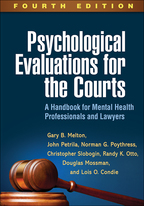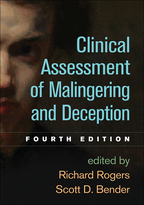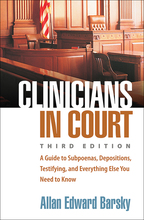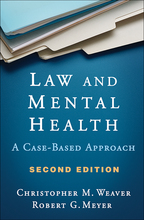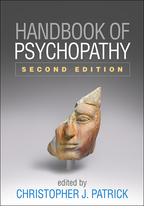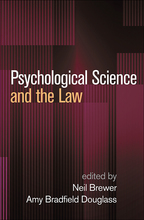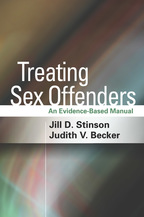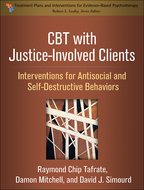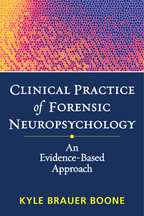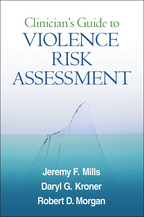Impulsivity
Theory, Assessment, and Treatment
Edited by Christopher D. Webster and Margaret A. Jackson
Hardcover
Hardcover
orderJune 20, 1997
ISBN 9781572302259
Price: $88.00 462 Pages
Size: 6⅛" x 9¼"
“Take an interesting idea of developing practical relevance, secure the services of insightful thinkers from a wide range of disciplinary backgrounds (including dissidents), arrange a conference and then have the papers skillfully edited into a coherent and structured volume full of stimulating ideas. That is what Chris Webster and Margaret Jackson have done with Impulsivity. A very wide range of issues and perspectives are considered, although more on the positive, socially valued, aspects of impulsivity would have been appreciated. From different disciplinary perspectives to applications to particular groups of people; from implications for risk assessment to different approaches to treatment, in 23 chapters. Different readers will find the volume timely for their own particular reasons; for me, as a lawyer, it is the recognition of the need to move away from dichotomous cognitive tests of responsibility toward assessments of ability to control behavior, to change, and to learn. This is a very stimulating and rewarding collection.”

—David Carson, L.L.B, Reader in Law and Behavioural Science, Faculty of Law, The University of Southampton
“Impulsivity: Perspectives, Policy, and Practice is an important and impressive collection of state-of-the-art reviews on theoretical, empirical, and clinical aspects of impulsivity, and the technology for its assessment and treatment. This book gives a lucid and readable account of the state of professional knowledge on impulsivity, then delivers a series of thoughtful and practical analyses of the implications and applications of this knowledge. This valuable resource for researchers and clinicians should go a long way toward 'bridging the gap' between knowledge and practice concerning issues of impulsivity, particularly as it pertains to risk for violence. This book squarely delivers on its promise as a comprehensive treatise on impulsivity, but it goes even further to make a significant contribution to the professional literature on violence risk assessment. This is the most comprehensive and definitive reference on impulsivity currently available.”

—Randy Borum, PsyD, Department of Psychiatry and Behavioral Sciences, Duke University Medical Center
“This book is a major contribution to the field. It is a very well written, wide-ranging, informative, and useful exploration of the nature, assessment, and treatment of impulsive antisocial behavior in adults and older adolescents. It also provides excellent guidelines for conducting violence risk assessments in a variety of circumstances. Impulsivity: Perspectives, Principles, and Practice should be required reading for all doctoral students in clinical psychology and related fields; and many practicing clinicians and other professionals who are concerned with impulsive individuals will find the book to be well worth reading and having on their shelves.”

—Thomas R. Litwack, PhD, JD, Professor of Psychology, John Jay College of Criminal Justice
—David Carson, L.L.B, Reader in Law and Behavioural Science, Faculty of Law, The University of Southampton
“Impulsivity: Perspectives, Policy, and Practice is an important and impressive collection of state-of-the-art reviews on theoretical, empirical, and clinical aspects of impulsivity, and the technology for its assessment and treatment. This book gives a lucid and readable account of the state of professional knowledge on impulsivity, then delivers a series of thoughtful and practical analyses of the implications and applications of this knowledge. This valuable resource for researchers and clinicians should go a long way toward 'bridging the gap' between knowledge and practice concerning issues of impulsivity, particularly as it pertains to risk for violence. This book squarely delivers on its promise as a comprehensive treatise on impulsivity, but it goes even further to make a significant contribution to the professional literature on violence risk assessment. This is the most comprehensive and definitive reference on impulsivity currently available.”
—Randy Borum, PsyD, Department of Psychiatry and Behavioral Sciences, Duke University Medical Center
“This book is a major contribution to the field. It is a very well written, wide-ranging, informative, and useful exploration of the nature, assessment, and treatment of impulsive antisocial behavior in adults and older adolescents. It also provides excellent guidelines for conducting violence risk assessments in a variety of circumstances. Impulsivity: Perspectives, Principles, and Practice should be required reading for all doctoral students in clinical psychology and related fields; and many practicing clinicians and other professionals who are concerned with impulsive individuals will find the book to be well worth reading and having on their shelves.”
—Thomas R. Litwack, PhD, JD, Professor of Psychology, John Jay College of Criminal Justice

